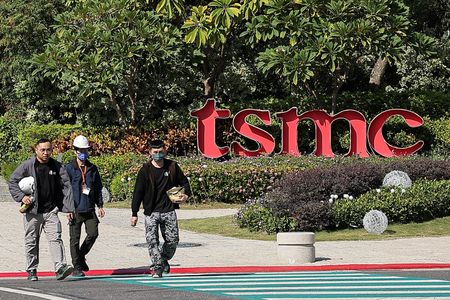By Josh Ye
HONG KONG (Reuters) -Tencent said it had shut some unprofitable businesses and promised a return to growth even if the economy stayed weak, after government clampdowns on its gaming business and COVID-19 lockdowns drove its first-ever quarterly sales fall.
The contraction marks a nadir for the gaming giant and owner of the WeChat messaging platform which has reported double digit growth almost every quarter since it went public in 2004, as Beijing’s crackdown on big tech companies that began in late 2020 puts the brakes on its expansion.
Chinese regulators in April lifted a nine-month freeze on gaming licences, but are yet to issue a new licence to Tencent, which has hammered sales at the company that makes much of its money by developing games such as ‘Honour of Kings’ and ‘Call of Duty Mobile’.
Revenue from online games decreased both at home and abroad by 1%.
Tencent President Martin Lau noted on a post-earnings call though, that China had issued no new regulation this year that was materially detrimental to the industry.
The company has shuttered non-core businesses in areas such as online education, e-commerce and game live-streaming, rationalised underperforming businesses, and significantly cut marketing costs, Lau said.
He added that he expects Wechat’s video accounts – a short-video rival to ByteDance’s Tiktok – to boost advertisement sales and become a big revenue driver.
“We believe with those three sets of initiatives taken together, we can return the business to year on year earnings growth, even if the macro environment remains as it is today,” said Tencent’s Chief Strategy Officer James Mitchell.
The company said on Wednesday revenue declined 3% to 134 billion yuan ($19.78 billion) for the three months ended June 30, the second straight quarter showing a fall but in line with analysts expectations.
Net profit attributable to equity holders tumbled 56% to 18.6 billion yuan, below analysts estimate of 25.3 billion yuan.
INVESTMENTS
Tencent, which has investments worth $90 billion in other companies, has been reducing its portfolio partly to appease regulators and also to book some hefty profits, according to sources.
Reuters reported on Tuesday that it plans to sell all or a bulk of its $24 billion stake in food delivery firm Meituan, a report that Tencent’s Chief Strategy Officer James Mitchell called inaccurate.
Tencent recently sold some of its holdings in Singapore-based gaming and e-commerce firm Sea Ltd to raise $3 billion. It also sold down some of its stake in Chinese e-commerce firm JD.com to hand more than $16.4 billion as a dividend to its shareholders.
Mitchell said Tencent remained active in acquiring new game studios outside China. In June, Tencent acquired Copenhagen-based Sybo Games, the developer of hit mobile game Subway Surfer.
Reuters reported earlier this month that Tencent was in talks to raise its stake in French video game giant Ubisoft.
The weakening economy took its toll on advertising revenue in the second quarter, which fell 18% to 18.6 billion yuan ($2.74 billion) as advertisers tightened budgets.
Revenue growth from Tencent’s fintech and business services slowed to 1% to 42.2 billion yuan ($6.22 billion), meanwhile.
Despite losing nearly 60% of its market value since a peak in February 2021, Tencent’s $373 billion market value still makes it China’s most valuable company.
($1 = 6.7756 Chinese yuan renminbi)
(Reporting by Josh Ye; editing by Elaine Hardcastle)









